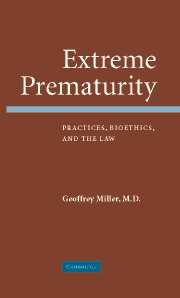Book contents
- Frontmatter
- Contents
- Part 1 THE EXTREMELY PRETERM INFANT: EPIDEMIOLOGY, PERCEPTIONS, AND PRACTICES
- Part 2 BIOETHICS
- Part 3 REPORTS, OFFICIAL OPINIONS, AND GUIDELINES
- Part 4 THE LAW
- 30 Introduction
- 31 U.S. Law
- 32 The United Kingdom
- 33 Canada
- 34 Australia
- 35 Japan
- 36 Italy, Germany, and Poland
- 37 France
- 38 The Netherlands
- Part 5 EPILOGUE: TRUTH, TRUST, AND BOUNDARIES
- References
- Index
33 - Canada
Published online by Cambridge University Press: 23 September 2009
- Frontmatter
- Contents
- Part 1 THE EXTREMELY PRETERM INFANT: EPIDEMIOLOGY, PERCEPTIONS, AND PRACTICES
- Part 2 BIOETHICS
- Part 3 REPORTS, OFFICIAL OPINIONS, AND GUIDELINES
- Part 4 THE LAW
- 30 Introduction
- 31 U.S. Law
- 32 The United Kingdom
- 33 Canada
- 34 Australia
- 35 Japan
- 36 Italy, Germany, and Poland
- 37 France
- 38 The Netherlands
- Part 5 EPILOGUE: TRUTH, TRUST, AND BOUNDARIES
- References
- Index
Summary
Although exactly how Canadian courts would rule in cases concerning the foregoing of life-sustaining treatment for extremely preterm infants is uncertain, there are some recent cases that indicate the extent of parental autonomy when they consent or otherwise to medical treatment for their children. As in other jurisdictions, the courts have a parens patriae obligation that will be exercised in the best interests of the child. The interpretation of best interests lies finally with the courts, but the law allows, as it should, broad leeway for parents to raise children as they think fit, provided it does not threaten the health and safety of those children. The law also imposes a duty of care on physicians but recognizes that there are circumstances where physicians are not obliged to treat where they believe there would be no overall benefit. In the Case of Child and Family Services of Central Manitoba v. RL,(363) a young infant suffered severe nonaccidental brain injury that eventually led to a diagnosis of a permanent vegetative state. The question before the court was whether the infant's physician could issue a “do not attempt resuscitation” order without the consent of the parents, who objected to the order. In ruling against the parents, Twaddle J A stated that:
- Type
- Chapter
- Information
- Extreme PrematurityPractices, Bioethics and the Law, pp. 168 - 172Publisher: Cambridge University PressPrint publication year: 2006



